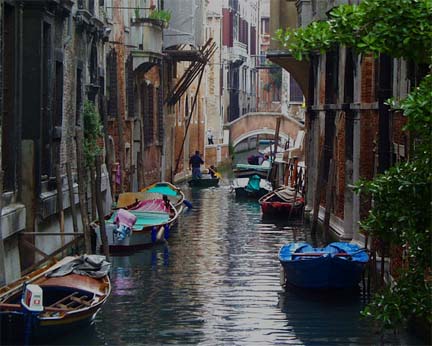
Venice
Nikolai Gumelev
It's late; the giants on the tower
loudly bang three times.
Traveler, if you aren't daunted,
stay silent and spy on the night.
Look! The City with the voices of Naiads'
in the elapsed spectral-light
with lacy patterns of old arcades,
where waters are frosted like glass.
True about these hiding witches,
behind black veils of gondolas:
Thousands of fiery bees
illuminate the lagoon all night.
The lion's head rests on the column
with buoyancy shine the grand beasts' eyes,
as he possesses Mark's Evangelic,
like Seraphim his magic wings.
Above the august cathedral heights,
a radiant luster from the mosaics;
the doves' clamors a delight to the ears:
cooing, splashing and deep sighs.
Might the cliffs be banter only,
the frosted waters — a cryptic witchcraft?
"Fire!" cries the horrified traveler,
"What if there's no one — all gone?"
He shouted out — nobody answered,
He slipped off the cliff, ergo he fell
onto the ancient Venetian mirrors,
far-far sites, obscure and pale.
Translated by Tatiana Pahlen in November 20, 1986
Copyright ©
2000 Tatianyc. All Rights Reserved.
Nikolai Gumelev, a romantic poet, (1886-1921) was the first husband of the iconic Russian woman,
often referred as an "academic poet," Anna Akhmatova. After joining the White Russian movement
and getting caught in the plot to overthrow the newly established Red Government, he was executed
by the Lenin's order at the age of 37. Their only son Lev Gumelev served the prison term
during the Stalin purges.
From 1907 Gumelev traveled extensively through Europe, notably in Italy and France. The experience
was vividly reflected in his new collection of poems, Romantic Flowers published in 1908. At the same time
he funded the literary magazine Sirius, which produced three issues in Paris. On returning to Russia,
he edited and contributed to the artistic periodical Apollon, the dreamy darling of the Russian Intellectuals.
Gumelev was infatuated with Africa, the continent he revisited almost every year.
He hunted lions in Ethiopia and contributed to the Saint Petersburg Museum of Anthropology
and Ethnography a large collection of African artifacts. His landmark work, The Tent (1921)
was dedicated to Africa. (This short introduction summary was written by Tatiana Pahlen).